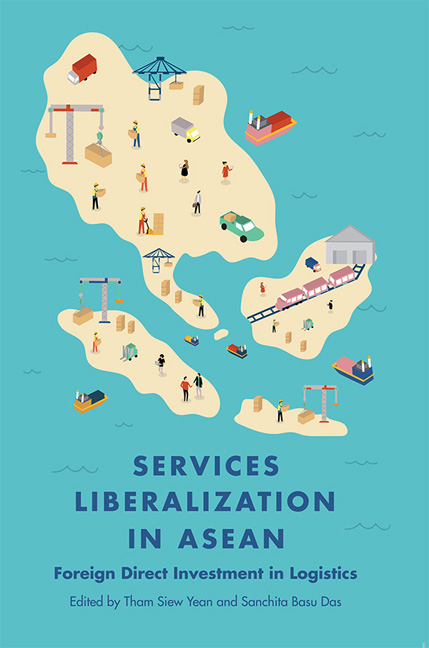Book contents
- Frontmatter
- CONTENTS
- List of Tables
- List of Figures
- Foreword
- Preface
- Acknowledgements
- Abbreviations
- About the Contributors
- 1 Introduction
- 2 Reforming Indonesia's Logistics Sector
- 3 FDI Liberalization in Malaysia's Logistics Services
- 4 Logistics Services Liberalization in the Philippines
- 5 Services Sector Liberalization in Singapore: Case of the Logistics Sector
- 6 Logistics Services Liberalization in Thailand
- 7 Services Liberalization in Vietnam: The Case of FDI in Logistics Sector
- 8 Services Liberalization: Case of Logistics in Brunei
- 9 FDI, Services Liberalization and Logistics Development in Cambodia
- 10 Services Liberalization in Lao PDR: FDI in Logistics Sector of a Land-linked Country
- 11 Facilitating FDI for the Logistics Sector in Myanmar: Agency, Incentives, and Institutions
- Index
Preface
Published online by Cambridge University Press: 04 July 2018
- Frontmatter
- CONTENTS
- List of Tables
- List of Figures
- Foreword
- Preface
- Acknowledgements
- Abbreviations
- About the Contributors
- 1 Introduction
- 2 Reforming Indonesia's Logistics Sector
- 3 FDI Liberalization in Malaysia's Logistics Services
- 4 Logistics Services Liberalization in the Philippines
- 5 Services Sector Liberalization in Singapore: Case of the Logistics Sector
- 6 Logistics Services Liberalization in Thailand
- 7 Services Liberalization in Vietnam: The Case of FDI in Logistics Sector
- 8 Services Liberalization: Case of Logistics in Brunei
- 9 FDI, Services Liberalization and Logistics Development in Cambodia
- 10 Services Liberalization in Lao PDR: FDI in Logistics Sector of a Land-linked Country
- 11 Facilitating FDI for the Logistics Sector in Myanmar: Agency, Incentives, and Institutions
- Index
Summary
A frequent question raised in discussions on Free Trade Agreements (FTAs) is the impact of liberalization in services on inflows of Foreign Direct Investment (FDI). Policymakers are concerned if liberalization has encouraged FDI inflows while researchers are keen to test the same relationship. Likewise, the public is curious as to whether FTAs are as useful as touted. Yet the relationship between liberalization and inflows of FDI is not as straightforward for services as in the case of manufacturing. This is because the services sector is frequently highly regulated due to information asymmetries between producers and consumers. Domestic regulations therefore play an important role in protecting domestic consumers but these regulations can at the same time hinder the entry of both domestic and foreign service providers. While liberalization is important, it is not sufficient and any attempt at investigating the impact of liberalization on inflows of FDI has to take into consideration the FDI enabling environment in a country.
Given this, we are motivated to undertake a study that can illuminate the academics, policymakers and businesses on liberalization issues in the services sector for the ten member countries in ASEAN. We decided to focus on FDI liberalization in services as commercial presence is considered as the most important mode of trade in services. Given the heterogeneity of the services sector, we chose to focus on the logistics industry as a case study as the industry plays a key role in the movement of goods, services and people across ASEAN.
The main objective of this book is, thus, to compare international and domestic policy measures for attracting FDI and its impact on inflows of FDI in the services sector in the ten ASEAN member countries. This has implications for ASEAN's economic cooperation, in general, and for the logistics sector integration, in particular.
- Type
- Chapter
- Information
- Services Liberalization in ASEANForeign Direct Investment in Logistics, pp. xvi - xviiPublisher: ISEAS–Yusof Ishak InstitutePrint publication year: 2017

